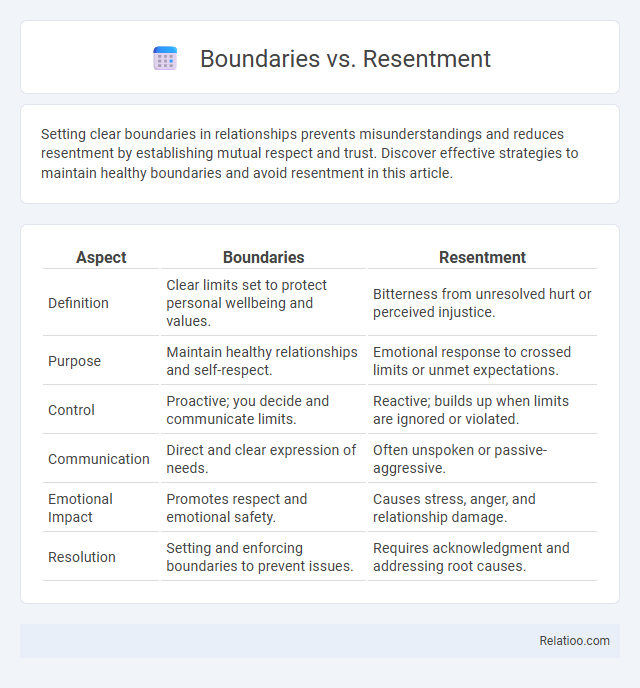Setting clear boundaries in relationships prevents misunderstandings and reduces resentment by establishing mutual respect and trust. Discover effective strategies to maintain healthy boundaries and avoid resentment in this article.
Table of Comparison
| Aspect | Boundaries | Resentment |
|---|---|---|
| Definition | Clear limits set to protect personal wellbeing and values. | Bitterness from unresolved hurt or perceived injustice. |
| Purpose | Maintain healthy relationships and self-respect. | Emotional response to crossed limits or unmet expectations. |
| Control | Proactive; you decide and communicate limits. | Reactive; builds up when limits are ignored or violated. |
| Communication | Direct and clear expression of needs. | Often unspoken or passive-aggressive. |
| Emotional Impact | Promotes respect and emotional safety. | Causes stress, anger, and relationship damage. |
| Resolution | Setting and enforcing boundaries to prevent issues. | Requires acknowledgment and addressing root causes. |
Understanding Boundaries: The Foundation of Healthy Relationships
Understanding boundaries establishes the foundation of healthy relationships by clearly defining personal limits and expectations, which prevents misunderstandings and emotional distress. Setting boundaries empowers you to communicate your needs respectfully, reducing the risk of resentment building up due to unmet expectations or feelings of being taken advantage of. Consistently honoring these boundaries fosters mutual respect and trust, ultimately enhancing relationship satisfaction and emotional well-being.
What Is Resentment and How Does It Develop?
Resentment is a complex emotional response characterized by persistent feelings of bitterness or anger toward perceived injustices or wrongdoings. It often develops when personal boundaries are repeatedly violated, leading to unresolved frustration and emotional pain. Understanding the connection between boundaries and resentment is essential for emotional well-being, as clear boundaries prevent the buildup of resentment by promoting respect and healthy communication.
The Link Between Unclear Boundaries and Growing Resentment
Unclear boundaries often lead to unmet expectations and feelings of being taken for granted, which can foster growing resentment in relationships. When your limits are not clearly communicated or respected, emotional exhaustion accumulates, causing frustration and bitterness over time. Establishing firm, transparent boundaries is essential to prevent resentment from undermining your personal and professional connections.
Signs You Need Stronger Personal Boundaries
Signs you need stronger personal boundaries include feeling consistently overwhelmed, exhausted, or taken advantage of in relationships. Frequent resentment, irritability, or emotional withdrawal often indicate that your limits are being crossed without proper respect. Establishing clear, firm boundaries fosters emotional well-being and prevents the buildup of resentment by promoting healthy communication and self-respect.
Emotional Impact: Living with Weak Boundaries and Resentment
Weak boundaries often lead to emotional exhaustion as individuals struggle to assert their needs, causing feelings of resentment to build over time. Resentment born from unclear limits can manifest as chronic stress, decreased self-esteem, and strained relationships. Establishing firm boundaries is essential for emotional well-being, preventing the toxic cycle of resentment and fostering healthier interpersonal dynamics.
Setting Boundaries Without Feeling Guilty
Setting boundaries is essential for maintaining healthy relationships and personal well-being, preventing the buildup of resentment caused by unmet needs or overcommitment. Clear, assertive communication about limits helps individuals protect their time, energy, and emotional health without succumbing to guilt. Practicing self-awareness and emphasizing that boundaries are acts of self-respect enables guilt-free enforcement and reduces long-term resentment.
Communication Strategies for Healthy Boundary Setting
Effective communication strategies for healthy boundary setting include clear, assertive language that defines personal limits without aggression or apology. Utilizing "I" statements helps express feelings and needs while minimizing defensiveness, preventing resentment from building. Consistent reinforcement of boundaries through honest dialogue promotes mutual respect and reduces misunderstandings, supporting emotional well-being and relationship health.
The Role of Self-Awareness in Preventing Resentment
Self-awareness plays a crucial role in preventing resentment by helping you recognize your personal boundaries and emotional limits before they are crossed. When you understand your needs and feelings clearly, you can communicate boundaries effectively, reducing the likelihood of built-up frustration or anger. This proactive approach minimizes resentment, fostering healthier relationships and emotional well-being.
Healing and Rebuilding Trust After Resentment
Establishing clear boundaries is essential for healing and rebuilding trust after resentment, as they create a safe space for open communication and mutual respect. Addressing the root causes of resentment allows individuals to process emotions and foster forgiveness, which is crucial for restoring healthy relationships. Consistent boundary-setting coupled with empathy promotes emotional healing and strengthens the foundation for renewed trust.
Practical Steps to Maintain Boundaries and Emotional Well-being
Maintaining clear boundaries involves consistently communicating your limits and recognizing when they are being crossed to prevent resentment from building. Practical steps include setting specific guidelines for interactions, practicing assertive communication, and regularly reflecting on your emotional state to address feelings before they escalate into resentment. Prioritizing self-care and seeking support from trusted individuals can reinforce these boundaries and promote long-term emotional well-being.

Infographic: Boundaries vs Resentment
 relatioo.com
relatioo.com